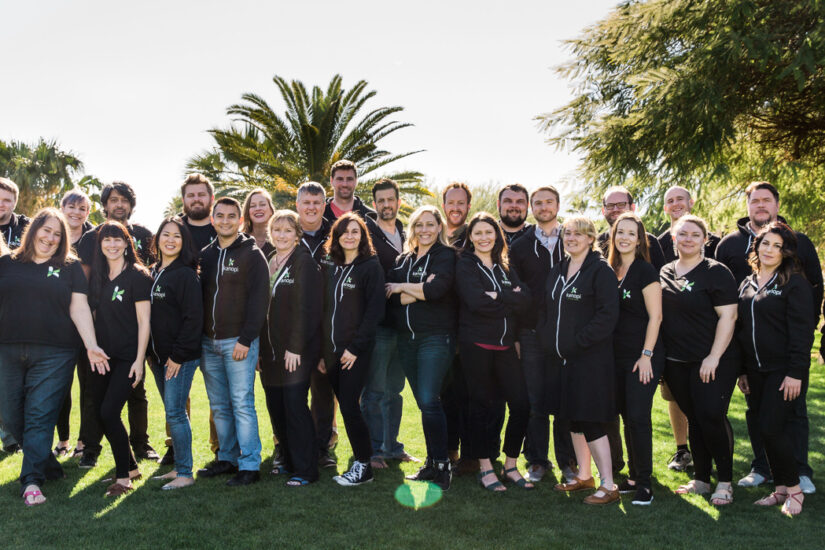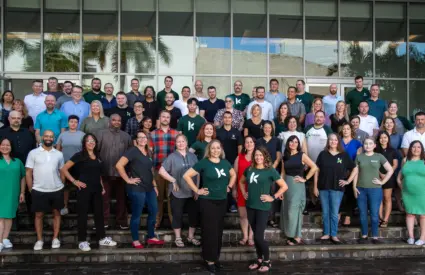As Kanopi Studios, we believe in sustainable websites, but also a sustainable environment. After all, Kanopi began due to a love of treehouses. Since we’re dedicated to creating as much of a positive impact as possible in the world, we certainly want to ensure we aren’t leaving a negative impact.
If we had a physical office, we would do company recycling, energy savings, etc to offset using those resources. As a remote agency, we are ecofriendly by design, as we neither have a central office, nor are we engaged in a lot of travel.
However, there are things we can all do at home to make our personal office spaces as eco-conscious as possible, even if we just donate our old items responsibly. We offer these tips and tricks so you too can have an eco-friendly office and lessen the impact on our environment.
Energy
- Fix drips and leaks on faucets.
- Fill your dishwasher and washing machines to the proper limits to make full use of the water.
- Line dry your laundry.
- Use energy efficient light bulbs.
- When your old appliances need replacing, look for energy-efficient appliances with the “Energy Star” label.
- Turn off all lights when you leave a room.
- Lower the temperature in your home during winter, and don’t overuse the air conditioner in the summer.
- Unplug any unused chargers and appliances.
- Seal all of your windows and/or replace them with more efficient double-paned windows.
- Get an energy audit! Your local energy companies will usually provide this for free.
Recycling
- Use recycled paper products
- Recycle plastic, metals, and glass whenever possible
- Dispose of ink cartridges safely
- Dispose of batteries safely
- Use rechargeable batteries
- Stop using disposable bags, and get in the habit of carrying your own recyclable bags and totes.
- Carry a water bottle rather than buy bottled water.
- Avoid as many single use containers as possible. This covers beverages, makeup, snacks, and so much more. Instead, buy bulk.
Transportation
- Use your bike, skateboard, unicycle, rollerblades, etc instead of a car. Or walk if it’s close enough. It’s good for your health and the environment!
- Use public transportation if you are traveling to a major metropolitan area.
- Combine your trips so you use your car less.
Home and Cleaning
- Purchase things like use reusable zip-close bags, face cloths, and wipes from places like the Zero Waste Outlet.
- Use chemical-free cleaning products. Switch to products that contain sustainably grown or raised ingredients that do not deplete the ecosystem, nor harm it when expelled back out. Some examples are dropps and the many items at EarthHero.
- Use cloth rags instead of paper towels. Save old tshirts and socks for this.
- Wash laundry in cold water rather than hot water.
- Use environmentally friendly shampoos and soaps.
- Use cloth napkins instead of paper napkins.
- Donate to — and shop at — thrift stores. You’ll be recycling perfectly usable items, supporting your local economy, and saving money.
- Before buying anything new, first check your local Craigslist, Freecycle, or Buy Nothing groups.
- Repurpose glass jars for storage and to use as containers.
- Install low-flow shower heads, faucets, and toilets.
- Collect rainwater, and use it to water your houseplants and garden.
- Switch to tree-free toilet paper. Try HeyBippy or HelloTushy.
- Use a safety razor or electric razor instead of a disposable plastic razor.
- Opt for products made of glass rather than plastic.
- Switch to reusable menstrual products like menstrual cups, period panties, and cloth pads.
- Avoid plastic wrap and instead use beeswax wraps.
- Use real plates and flatware instead of paper plates and plastic cutlery.
- Get rid of the Kuerig and opt for a trash-free options such as pour-over or french press, then throw those grounds into your compost pile!
- Opt for looseleaf tea (tea bags are made with plastic!)
- Rather than throw things away, find a local repair shop (tailors, cobblers, and woodworkers) to get all of your items repaired.
- Use cloth diapers either exclusively or in combination with disposable diapers. Even one cloth diaper a day keeps 365 of them out of landfill each year.
- Are you moving any time soon? Here’s a guide on how to lessen the environmental impact of your move.
Food
- Plant a garden. It doesn’t have to be large or complicated. Start small and go from there. Plus kids love it!
- Switch to shade-grown coffee with the “Fair Trade” label.
- Eat less meat. Meat and dairy are responsible for the majority of greenhouse gas (GHG) emissions in the agriculture industry.
- Plan your meals so you buy the right amount of food in order to cut down on food waste.
- Eat the ends and stems. Don’t throw out the tops of the carrots and beets. Beet tops make a great chard substitute and carrot tops make a delicious pesto. Check out this cookbook for tips on how to use your scraps.
- Have leftover food? Create your own compost bin for $15
- Join a CSA (community supported agriculture) to receive local, farm-fresh delivered to your doorstep.
Other
- Switch to paying your bills online. This avoids the additional paper, postage, and energy to deliver the bill to your mailbox.
- Buying a new car? Look at an electric or hybrid vehicle.
- Use recycled gift wrap and reuse the ribbons.
- Stop using single use plastic straws, Instead look at metal, bamboo, or silicone straws. Here are some great suggestions.
- Look for recycled content and corporate responsibility programs where products can be returned at the end of their life.
Additional Resources:
- Books:
- Videos and Documentaries
- Food Inc.
- Our Planet
- Short movies from The Story of Stuff
- Blogs:
- Environmentally-friendly Office Supplies









